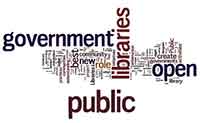Center for Technology in Government publishes Enabling Open Government for All: A Roadmap for Public Libraries
Jan. 8, 2015
(518) 442-3892
A new report from the University at Albany’s Center for Technology in Government (CTG) addresses growing questions about how “open government” is influencing, and possibly transforming, the role of public libraries in their communities.
The report, Enabling Open Government for All: A Roadmap for Public Libraries, concludes a year-long project supported by an independent federal agency, the Institute of Museum and Library Services (IMLS), through a 2013 Laura Bush 21st Century Librarian Program (LB21) grant. It brought together thought leaders from government, academia, and civil society.
“The public library as information hub, steward and intermediary, has long been an important community resource,” said Theresa Pardo, CTG Director. “In the 21st Century, the public library is increasingly being called on to take a more significant role in responding to community needs that, while consistent at the highest level with the traditional role of public libraries, creates the need for a new perspective on the role of the public library.”
 The report is the result of a series of project activities, including consultation with an expert advisory committee, an online forum for discussion of the issues and questions, and a face-to-face workshop with more than 40 participants to outline the set of recommendations. Based on research conducted by CTG and expert consultations with the advisory committee and other participating thought leaders, it offers six recommendations for public libraries to help them best contribute to and influence the opening of government within their communities:
The report is the result of a series of project activities, including consultation with an expert advisory committee, an online forum for discussion of the issues and questions, and a face-to-face workshop with more than 40 participants to outline the set of recommendations. Based on research conducted by CTG and expert consultations with the advisory committee and other participating thought leaders, it offers six recommendations for public libraries to help them best contribute to and influence the opening of government within their communities:
- Define the public library’s role in community-focused open government activities.
- Focus on the demand side of open government.
- Adopt a community-wide perspective on open government.
- Build capability to create and sustain new kinds of partnerships with a wider range of community actors.
- Build a knowledge base of public library open government initiatives.
- Carry out a set of pilot projects focused on building a new understanding of preferred and best public library open government practices.
“We won’t have open government, accountability or citizen engagement unless our citizens can find and use government data and records,” said IMLS Director Susan H. Hildreth. “At a time when more and more of that information is only available online, public libraries can play a critical role as a trusted intermediary, supporting the work of government agencies and realizing the rights of the American people.”
In addition, the report provides two resources to support the implementation of these recommendations and help public libraries to build an open government agenda:
- A Preliminary Typology of Public Library Open Government Activities
- A Demand-side Open Government Planning Model for Public Libraries, Version 1.0
“Use of this report by public libraries will support the determination of where in the current open government landscape a particular public library can create the most public value by responding to its community’s most important open government aspirations,” said Pardo. “In addition, the project recommendations and resources will help public libraries identify and address the skills and resources needed to fulfill their roles in enabling open government.”
To view a copy of the report, visit: http://www.ctg.albany.edu/publications/enabling_open_gov_for_all/
#####
The mission of the Center for Technology in Government at the University at Albany is to foster public sector innovation, enhance capability, generate public value, and support good governance. We carry out this mission through applied research, knowledge sharing, and collaboration at the intersection of policy, management, and technology.
Educationally and culturally, the University at Albany-SUNY puts "The World Within Reach" for its more than 17,300 students. An internationally recognized research university with 118 undergraduate majors and minors and 138 graduate programs, UAlbany is a leader among all New York State colleges and universities in such diverse fields as criminal justice, information science, public administration, social welfare, business and sociology. With a curriculum enhanced by 500 study-abroad opportunities, UAlbany launches great careers. Visit UAlbany's extensive roster of faculty experts.
The Institute of Museum and Library Services is the primary source of federal support for the nation’s 123,000 libraries and 35,000 museums. Our mission is to inspire libraries and museums to advance innovation, lifelong learning, and cultural and civic engagement. Our grant making, policy development, and research help libraries and museums deliver valuable services that make it possible for communities and individuals to thrive. To learn more, visit www.imls.gov and follow us on Facebook and Twitter.